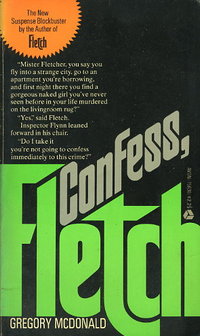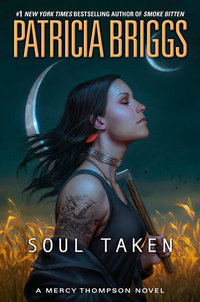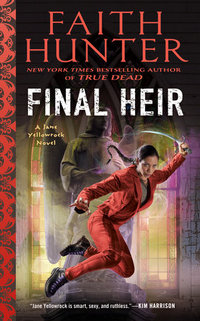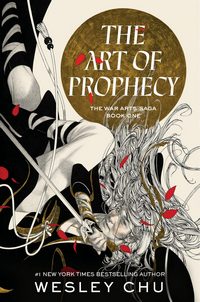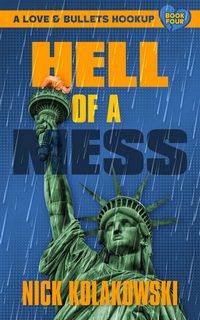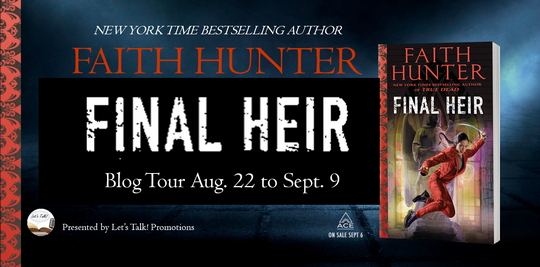
by Faith Hunter
DETAILS:
Series: Jane Yellowrock, #15
Publisher: Ace Books
Publication Date: September 5, 2022
Format: eARC
Length: 464 pg.
Read Date: August 15-18, 2022


What’s Final Heir About?
The Vampire War in Europe is over—and the old guard seems to be defeated. Edmund is on his way to NOLA to be crowned and then some stability–and whatever passes for peace with the Mithrans should settle in for some time.
But first…there’s the Heir to deal with. The last hope of the Sons of Darkness, the old ways—and possibly a turn to a darker time for humanity—still needs to be dealt with. Years ago, Leo Pellissier was given a prophecy about the defeat of the Heir and after Jane came to work for him, he decided she was at the center of the prophecy. Jane, as the Dark Queen, could defeat him. So Leo set to work organizing things in the way that only he can.
Now it’s the endgame—time for the rest of the dominos that Leo set up to fall, for Jane to end the Heir, and change everything for the Mithrans. And possibly the rest of the supernatural world. Assuming she can. There’s no certainty about that. There’s also no certainty about who will survive this endgame—even if she manages to vanquish the Heir,* she may not survive the attempt. Even worse (in her mind) family, friends, and allies may die.
* He’s a significant enough power that I don’t feel too silly using a word like vanquish.
This isn’t going to be easy. This is for all the marbles—and that’s a great way to end a series.
The Youngers
Of all the characters we met along the way, I may miss Alex and Eli the most (as soon as I say that, I start to think about Angie, and question myself—but I really don’t have time to go into that). Eli hasn’t changed much since we first met him—he’s opened up a bit more, he may be a bit more emotionally mature, but he’s essentially the guy we met at the beginning. Faith Hunter’s answer to Joe Pike. He knows his business, he enjoys the work (as grim as it is)—maybe finds a peace in a fight that he can’t find elsewhere. He’s also incredibly loyal, he takes care of his people—first and foremost, his brother.
Aside from Jane, no character in the series has changed—grown, developed, and matured–than Alex Younger. He started off as a rebellious, unhygienic, hacker—focused only on what he could do with his computer. And maybe not letting his brother down (too much) again. He’s now an adult, he’s responsible, he can handle himself in a fight, and there are things/people he cares about in his life—he’s still a wiz with the computers, thankfully. He’s essentially a version of Alex with a different weapon-set.
Their humanity (Eli is still largely human) is one of the few lasting examples we have in the series at this point, and they keep things grounded in the middle of all the vampires, weres, witches, extradimensional beings, and whatnot. They’re great because of that, they’re great outside of that, too.
I do feel bad for poor Eli—in the last couple of books, he’s really taken a beating. It’s even worse in this novel. If he survives to the end (I’m carefully not answering), he’s going to have physical and psychological scars that are going to last. I know he wouldn’t have it any other way, he gets them doing what he thinks is right. But still, you can’t help but feel for the guy.
Beast
The Beast and Jane dialogue/interchanges in this novel were fantastic. I relished each of them.
Once again, Beast has her own agenda—as is her right and fitting for her character. But given the stakes here, some of the information she decides not to pass on to Jane is hard to believe. Sure, Beast may not get all the details, but I don’t see how she doesn’t understand the urgency and the importance of what’s going on.
But you know what? I just didn’t care. I like how Beast is her own creature—she comes through for Jane when the chips are down, but on her terms.
Homecoming Week
There are so many supporting characters in this book, that it’s really hard to fathom. There are so few characters from the series (that are still living/undead) that don’t at least get a named drop or a check-in. But several show up for more. There were characters that we’d lost track of—a couple that I’d forgotten even existed played a role in this book.
Hunter pulled out all the stops for this book.
I’m probably not alone in spending time reflecting on the series as a whole as I read this book, and bringing up so many names from the past (ones we may have regretted losing track of—and a couple we were probably happy to have lost) really helped with that.
The Chapter Titles
I don’t think I’ve talked about the chapter titles in these books before—and that’s a crying shame. I’m not a big fan of chapter titles in general, but this series has featured some doozies. Several of them in Final Heir are amongst the best in the series. I really don’t have a lot to say about them—but complimenting the chapter titles is overdue. There’s a lot that Hunter does right in these books, and this is just one of the more consistent and amusing.
Final Heir as a Series Finale
I’m not entirely sure it’s fair to do, but I can’t help but think about other series finales–particularly in the UF genre.* Last year, I compared the Alex Verus finale to the Iron Druid Chronicles. Final Heir doesn’t match up well with either of them–it’s more like the ending of the Kitty Norville series (and not dissimilar to the ending of The Hollows)—Jane and her friends and allies are up against a vampire (and his forces) bent on world domination in a final face-off. Okay, now that I start thinking about it, there are a lot of parallels between the two–but this isn’t the time for that.
* Benedict Jacka’s been talking about ending his series recently, and a lot of what he’s had to say is helpful when thinking about things like this. I’m not going to use his categories to talk about Final Heir because of spoilers, but if you haven’t read these posts (even if you haven’t read the Alex Verus series)—go check it out after you read Final Heir.
Hunter has spent several books lining things up for this confrontation—not unlike Leo Pellissier’s machinations in getting Jane to this point. Looking back at all the ins and outs from this perspective really is impressive. Final Heir is filled with combat and battles—maybe more than most novels in this series, they’re definitely more savage and meaningful. I don’t have a word-count, but I’d wager the final battle is longer than any we’ve yet encountered in the series. Hunter really gave her fans what they’ve been wanting (and will be missing). This is an epic villain, with giant stakes, it has to be an epic scene.
Better yet, following the battle, the novel’s dénouement also serves as one for the series—and if the final battle gave fans what they wanted, then they’re going to be knocked for a loop by the dénouement. We get the few dangling threads tied up and a good look at what the future offers for most of the characters.
I had expected a lot from the finale aspect of this book, and Hunter surpassed it.
So, what did I think about Final Heir?
I think this is a bit more rambling than I want to be—it’s also longer than it necessarily needs to be. Part of that is because there’s so much to talk about in this novel—and I’ve barely scratched the surface so I don’t give it all away. Part of the longer-than-usual nature of the post is also that there’s part of me that knows I’m pretty much done with these characters when I hit “Schedule.” Sure, I’ll listen to the audiobook sometime next year, and I’ll likely re-read/re-listen to the series sometime after that. But all of that is revisiting. Finishing here is finishing the series, so I’m trying to drag it out.
For the first four or five books, this series served to fill the time while I was waiting for other Urban Fantasy books to come out. But around then it took on the role of being something I needed filler for while waiting for the next Yellowrock book. And lately, it’s one of those series I organize my reading schedule around. Listening to the series on audio over the last year has really helped me see all the ways Hunter’s been preparing the characters and the readers for these events, and it’s truly impressive. As it now stands, the Jane Yellowrock series ranks near the top of the UF pantheon for me (completed or on-going series), beating out stiff competition.
But let’s set that aside for a moment and just focus on this book—it’s full of all the action, the heart, the magic, and sense of family we’ve grown accustomed to. Jane Yellowrock finally finds her place in this world (sure, she found it before, but it’s more solidified now), her priorities are intact, she’s doing good in ways she hasn’t been able to before–and those that she cares about (many she’d never have considered caring for 15 books ago) are in good places. Just for the character work alone around Jane, this book is worth the time.
I think someone new to this series would come away from this one entertained and impressed—I don’t know why someone would do that, but I’m sure someone will.
From the jaw-dropping (whoa, Hunter’s taking no prisoners!) first chapter to the last lines that genuinely made me misty, Final Heir was a great ride. If I have to say au revoir to Jane, Bruiser, Eli, Alex, and the rest—especially Beast—this is was quite the way to do it. Bravo, Faith Hunter.
Disclaimer: I received this eARC from Let’s Talk! Promotions and Berkley Publishing Group via NetGalley in exchange for this post — thanks to all for this.

This post contains an affiliate link. If you purchase from it, I will get a small commission at no additional cost to you. As always, the opinions expressed are my own.


My thanks to Let’s Talk! Promotions for the invitation to participate in this tour and the materials (including the book via NetGalley and Berkley Publishing Group) they provided.
 This is a weekly bloghop hosted by Freda’s Voice.
This is a weekly bloghop hosted by Freda’s Voice. Grab a book, any book.
Grab a book, any book. Turn to Page 56 or 56% on your ereader. If you have to improvise, that is okay.
Turn to Page 56 or 56% on your ereader. If you have to improvise, that is okay. Find a snippet, short and sweet.
Find a snippet, short and sweet. Post it.
Post it.
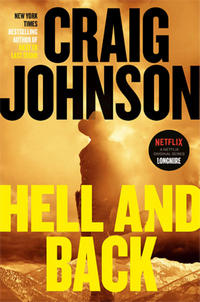
![]()


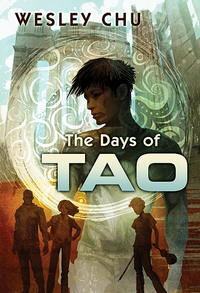



 Okay, the over-use/over-reliance on Crow, basically making him Jesse’s Hawk, bugs me. It also doesn’t do that any favors for the character of Crow or Jesse—and really doesn’t help Molly’s character in any conceivable way (although Lupica may have a long game there). Parker (inadvertently?) tamed Hawk by using him too much—and was well on the way to doing that with Bobby Horse and Chollo, too. And now Lupica’s doing that with Crow. Use him less (far less) and he retains his mystery, his edge, and his ability to do the things that Jesse won’t do.
Okay, the over-use/over-reliance on Crow, basically making him Jesse’s Hawk, bugs me. It also doesn’t do that any favors for the character of Crow or Jesse—and really doesn’t help Molly’s character in any conceivable way (although Lupica may have a long game there). Parker (inadvertently?) tamed Hawk by using him too much—and was well on the way to doing that with Bobby Horse and Chollo, too. And now Lupica’s doing that with Crow. Use him less (far less) and he retains his mystery, his edge, and his ability to do the things that Jesse won’t do.